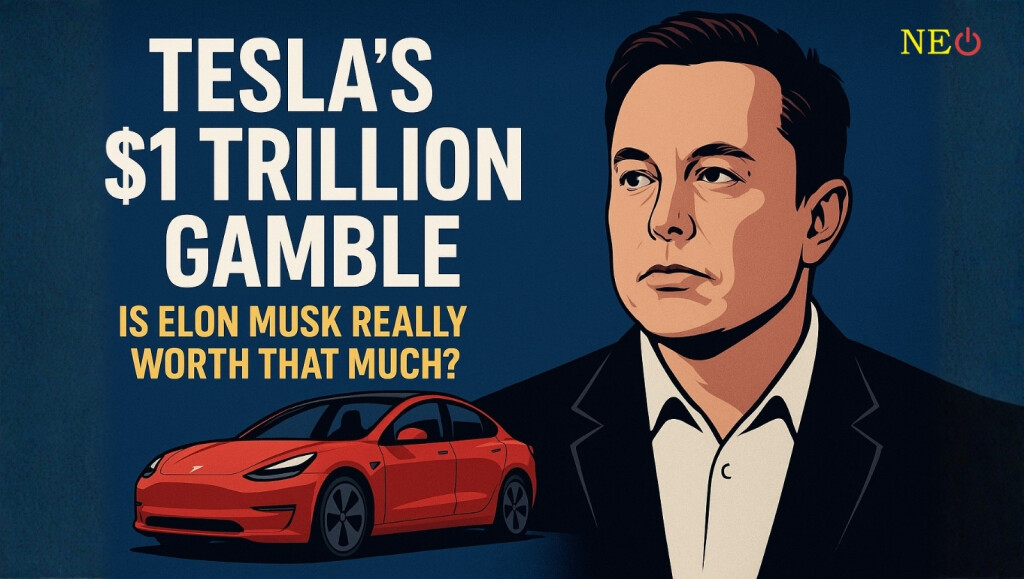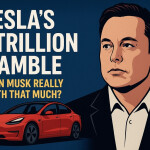In a move that has stirred wide debate across finance and corporate governance, Tesla, Inc. has locked in approval from its shareholders for a compensation plan for Elon Musk that could be worth as much as $1 trillion. The big question now: Does Tesla really need Musk that much? Let’s unpack the rationale, the risks and the implications.
Table of contents [Show]
What the pay deal entails
- The pact ties Musk’s possible reward to some extremely aggressive goals: the company’s market valuation rising from about ~$1 trillion today to ~$8.5 trillion, annual profits surging to hundreds of billions of dollars, delivering ~20 million vehicles, launching 1 million robot-taxis, selling ~1 million humanoid robots, and growing its subscription services dramatically.
- If fully achieved, Musk would gain roughly an additional 12% stake in Tesla (boosting his ownership to ~25%) and become—effectively—the first person ever to reach a trillion-dollar payday from a single corporate package.
- The structure also includes a condition of long tenure (at least ~7.5 years) and a CEO‐succession plan requirement.
- The board argues Musk is essential: its rationale statement said only he “can unlock Tesla’s full potential”.
Why Tesla (and its board) say they need Musk
- Vision-setting: Musk has driven Tesla from electric-cars upstart to global up-and-coming smart mobility / AI / robotics company. The board evidently believes that his unique combination of technical vision and founder status gives Tesla a differentiator many rivals lack.
- Retention risk: The board warned that if Musk were to depart, Tesla risks losing significant value and direction.
- Ambitious pivot: Tesla is no longer only about electric cars — the compensation goals reflect ambitions in robotaxis, humanoid robots (Optimus), autonomous driving and subscription business models. Musk is seen as the linchpin of this pivot.
But do they really need him that much? The risks and counterpoints
- Over-dependence on one person: Relying so heavily on Musk raises what corporate governance professionals call “key‐person risk” — if Musk is distracted, leaves, fails to deliver, Tesla might suffer. Indeed, some investors strongly objected to the size and structure of the payout.
- Ambitious targets, uncertain delivery: While Tesla has delivered impressive growth in past years, the goals tied to the pay package (e.g., $8.5 trn valuation, 1 m robot-units, robotaxi fleets) are extremely lofty and carry significant execution risk.
- Governance & shareholder dilution: Opponents argue the reward is excessive and sets a poor precedent. It gives Musk far greater control and may dilute other shareholders’ interests.
- Brand and management risks beyond Musk: Tesla faces competition in EVs, regulatory scrutiny, supply-chain complexity and reputational challenges. The company cannot rely solely on Musk’s brilliance; execution, operations and broader leadership matter.
- Is the founder always the best person for the next phase? As companies scale beyond their founder’s original vision (from EV maker to full robotics/AI player), sometimes a different leadership profile is required for integration, mass production, regulatory navigation and global expansion. The package itself includes a succession plan requirement — implicitly acknowledging this risk.
My take: Balanced view
Yes — Tesla does believe it needs Elon Musk to stay aboard and lead its ambitious next decade. The board’s language and terms make clear they consider him indispensable for the transformation from car-maker to robotics/AI leader. In that sense, the package is a mechanism to retain a founder whose departure the board fears would leave a vacuum.
But the size and structure of the package raise significant questions. The magnitude of the reward is so large it invites skepticism about whether Musk (or anyone) can credibly deliver the targets. It also suggests that Tesla is placing a huge bet on its future direction — and on Musk’s role as the engine of that change — rather than diversifying risk across leadership.
In short: Tesla needs Musk in the sense that the board believes he’s uniquely capable of driving their vision. Whether they should hand him such a reward (and absolute reliance) is another matter — this is a high-stakes gamble. For shareholders, what really matters now is not the headline number, but whether Musk can deliver on the milestones and whether Tesla builds robust systems beyond his personal leadership.
Final thoughts
If Musk succeeds: This package could look like a masterstroke—he helps Tesla redefine mobility and robotics, Tesla becomes far more valuable, shareholders benefit, and Musk’s leadership is validated.
If he doesn’t: It could become a symbol of over-concentration and risk — a founder’s pay package that ballooned while key goals were missed, governance questions rose, and alternatives were insufficient.
So, do they really need him that much? Perhaps yes — for now — but it remains open whether Tesla’s dependence on Musk is a competitive advantage or a potential vulnerability. Watching Tesla’s performance over the next 5–10 years (and not just Musk’s stock awards) will tell the full story.









